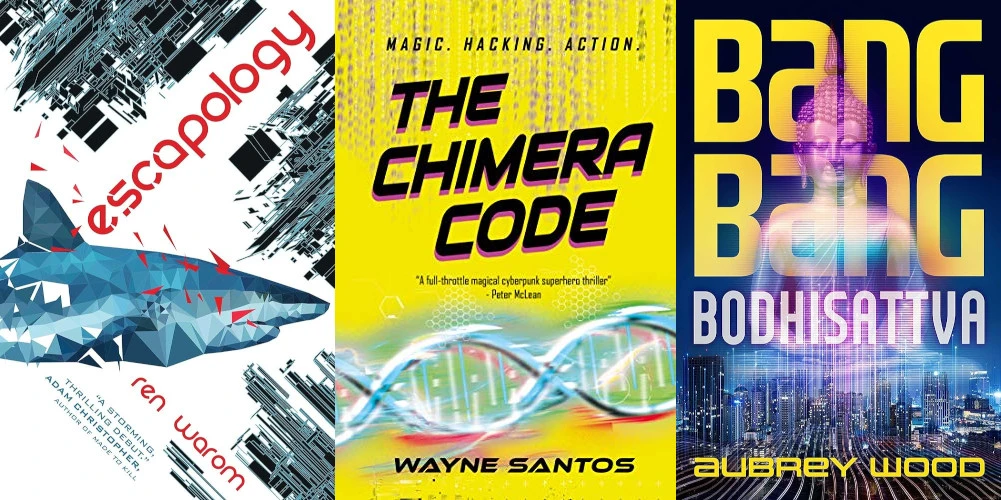I read a lot of random cyberpunk novels from the kindle store and I'm always on the lookout for more. Cyberpunk novels are annoyingly difficult to find since the "cyberpunk" category on amazon is nothing but LitRPG, but that's a different rant altogether.
Anyway, I don't actively try to find trans characters in literature (I'm not trans) but I don't avoid books that have trans characters. I figure trans characters actually fit pretty well into cyberpunk universes. So for anyone who is interested in reading cyberpunk stories with trans characters, here are the ones I've read:
Escapology by Ren Warom - The main character is trans but is post-transition so the fact that he's trans isn't even mentioned until ~80% into the book. And it's really only revealed so the villain can make trans-based insults about the main character just to get him riled up. Given that the character is post-transition, I liked the fact that being trans didn't define who he was, it was just something from his past that he didn't really think about anymore. Of course, this also means the reveal of being trans almost felt tacked-on and an after-thought. But in the sequel, Virology, everyone's cyberspace avatars are visible in the real world and the main character has a theory that being trans affected how his avatar behaves. So being trans does eventually have an effect and doesn't feel tacked-on anymore.
The Chimera Code by Wayne Santos - This novel is about a mercenary crew where each person has their role (the leader, the hacker, the muscle, etc.). Their hacker dies so they need to recruit a new one (they even load up the old hacker's consciousness like Dixie Flatline to train the new hacker, so that's fun). Anyway, the new hacker they find is non-binary. This is handled pretty well where every time a new character meets this hacker they ask for the hacker's pronouns. The hacker tells them, and they move on with the story. So the hacker being non-binary is handled throughout the book but it's never a main theme of the story. The plot continues to drive forward regardless of the hacker's gender.
Bang Bang Bodhisattva by Aubrey Wood - This novel is about two characters trying to solve a murder mystery. One acts like he's a hard-boiled detective in a film noir while the other is trans and mid-transition. Now, given that the trans character is mid-transition I'm sure this makes sense, but being trans is a constant topic of discussion. It's like having a character who's vegan constantly telling you they're vegan. Again, I'm not trans, so I don't doubt that someone who is mid-transition constantly has it on their mind. But as a reader, yeah, I get it, she's trans. She's also pansexual and in a polyamorous relationship. I feel like this is more of the focus of the story than the murder mystery. I do like that the author changes writing styles depending on which character is the POV of the chapter. So the detective character always has short, terse sentences while the trans character has more free-flowing sentences. But this is the only novel in the list where I went "ok, this novel isn't meant for me." It feels more like a novel for trans people than just including trans people.
And that's it. Those are the cyberpunk novels I've read with trans characters. I find it interesting how it spans from "almost feels like an after-thought" to "handled, and not a factor" to "ok, I get it, stop talking about it". Honestly, I'm not sure what the "right" way is to handle trans characters so I figure it's good to cover this whole spectrum.

When Gravity Fails by George Alec Effinger is a kind of complicated recommendation for this. It features I think the most trans characters I’ve ever seen in one book, the main character’s girlfriend and most of their acquaintances are trans, and the story treats them decently as people with jobs and lives outside of that part of their identity. The problem, if it is one, is that they’re all sex workers. I can’t remember any trans character in the book who isn’t. This fits the story decently as they’re all living in the Budayeen, the entertainment and criminal quarter of an unnamed Middle-Eastern city, the only place where they, and small-time criminals like the protagonist, can exist with a minimum of hassle. But there’s some complicated history and pop-cupture entanglements around being trans and being a sex worker (and the limited other roles historically available to them) which might change how audiences read this forty years later. I honestly have no idea. I quite liked the book, it’s weird in places (for other reasons) but that’s what I read cyberpunk for, and it has a bunch of awesome cyberpunk concepts, a unique setting, and some creative misuses of technology.
The Murderbot books feature a pretty diverse spread of characters, gay, nonbinary, and also people in polyamorous relationships, though that stuff usually doesn’t impact the main plot. Murderbot itself is about as asexual as it’s possible to get which probably explains that a bit. Their tone isn’t super cyberpunk but the themes and concepts very much are.
I think the Gibson short story Johnny Mnemonic or Burning Chrome has a pair of guards, one of whom is trans, but it’s clearly been awhile since I read it. Gibson’s Sprawl books all had a kind of fascination with extending cosmetic surgery past sex and race, identity being as changeable as hairstyle, so it comes up in passing occasionally.